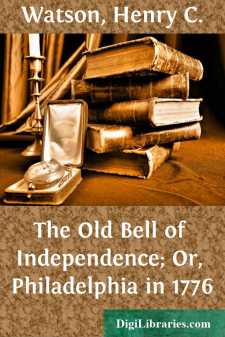Categories
- Antiques & Collectibles 13
- Architecture 36
- Art 48
- Bibles 22
- Biography & Autobiography 813
- Body, Mind & Spirit 142
- Business & Economics 28
- Children's Books 15
- Children's Fiction 12
- Computers 4
- Cooking 94
- Crafts & Hobbies 4
- Drama 346
- Education 46
- Family & Relationships 57
- Fiction 11828
- Games 19
- Gardening 17
- Health & Fitness 34
- History 1377
- House & Home 1
- Humor 147
- Juvenile Fiction 1873
- Juvenile Nonfiction 202
- Language Arts & Disciplines 88
- Law 16
- Literary Collections 686
- Literary Criticism 179
- Mathematics 13
- Medical 41
- Music 40
- Nature 179
- Non-Classifiable 1768
- Performing Arts 7
- Periodicals 1453
- Philosophy 64
- Photography 2
- Poetry 896
- Political Science 203
- Psychology 42
- Reference 154
- Religion 513
- Science 126
- Self-Help 84
- Social Science 81
- Sports & Recreation 34
- Study Aids 3
- Technology & Engineering 59
- Transportation 23
- Travel 463
- True Crime 29
The Old Bell of Independence; Or, Philadelphia in 1776
by: Henry C. Watson
Description:
Excerpt
STORY OF GENERAL WASHINGTON.
"GRANDFATHER," said Thomas Jefferson Harmar, "won't you tell us something about General Washington?"
"I could tell you many a thing about that man, my child," replied old Harmar, "but I suppose people know everything concerning him by this time. You see, these history writers go about hunting up every incident relating to the war, now, and after a while they'll know more about it—or say they do—than the men who were actors in it."
"That's not improbable," said young Harmar. "These historians may not know as much of the real spirit of the people at that period, but that they should be better acquainted with the mass of facts relating to battles and to political affairs is perfectly natural." The old man demurred, however, and mumbled over, that nobody could know the real state of things who was not living among them at the time.
"But the little boy wants to hear a story about Washington," said Wilson. "Can't you tell him something about the man? I think I could. Any one who wants to appreciate the character of Washington, and the extent of his services during the Revolution, should know the history of the campaign of 1776, when every body was desponding, and thinking of giving up the good cause. I tell you, if Washington had not been superior to all other men, that cause must have sunk into darkness."
"You say well," said Smith. "We, who were at Valley Forge, know something of his character."
"I remember an incident," said Wilson, "that will give you some idea, Mrs. Harmar, of the heart George Washington had in his bosom. I suppose Mr. Harmar has told you something of the sufferings of our men during the winter we lay at Valley Forge. It was a terrible season. It's hard to give a faint idea of it in words; but you may imagine a party of men, with ragged clothes and no shoes, huddled around a fire in a log hut—the snow about two feet deep on the ground, and the wind driving fierce and bitter through the chinks of the rude hovel. Many of the men had their feet frost-bitten, and there were no remedies to be had, like there is now-a-days. The sentinels suffered terribly, and looked more like ghosts than men, as they paced up and down before the lines of huts."
"I wonder the men didn't all desert," remarked Mrs. Harmar. "They must have been uncommon men."
"They were uncommon men, or, at least, they suffered in an uncommon cause," replied Wilson. "But about General Washington. He saw how the men were situated, and, I really believe, his heart bled for them. He would write to Congress of the state of affairs, and entreat that body to procure supplies; but, you see, Congress hadn't the power to comply. All it could do was to call on the States, and await the action of their Assemblies.
"Washington's head-quarters was near the camp, and he often came over to see the poor fellows, and to try to soothe and comfort them; and, I tell you, the men loved that man as if he had been their father, and would rather have died with him than have lived in luxury with the red-coat general....


